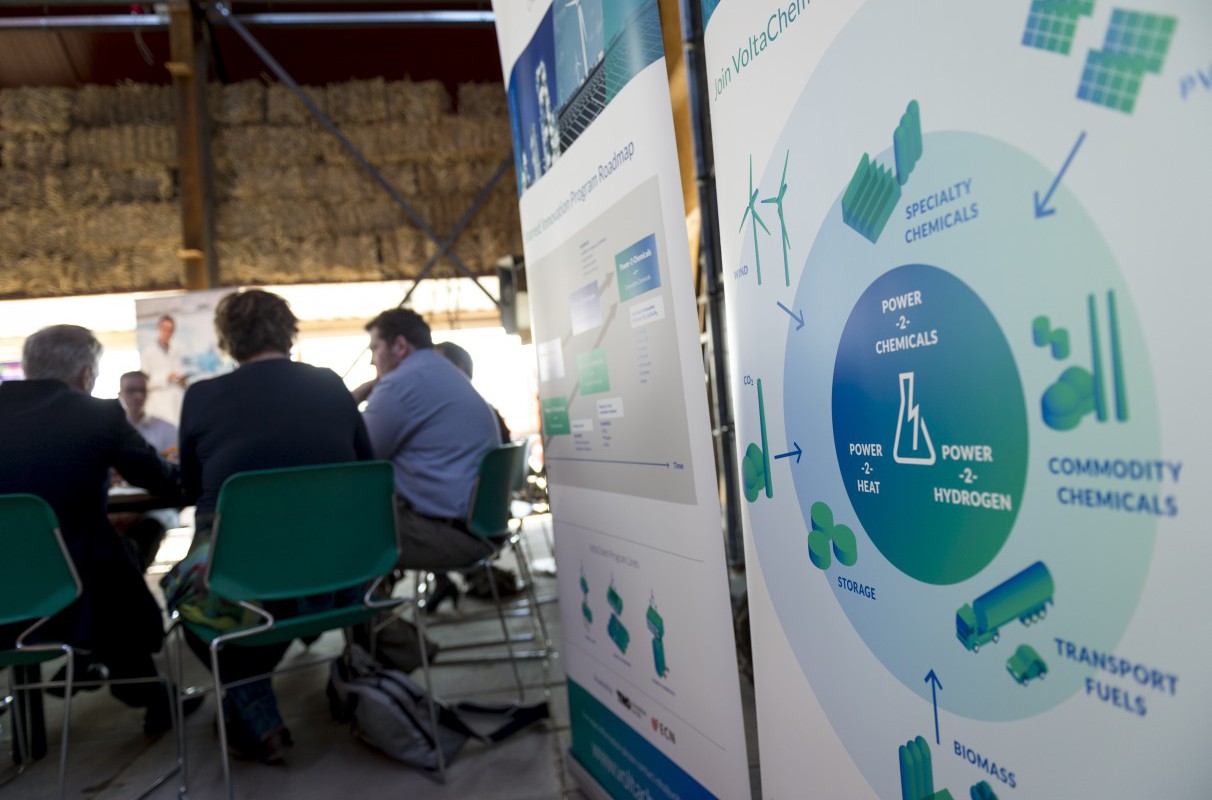Breakout sessions VoltaChem Annual Event 2017
On November 9th 2017 VoltaChem will host its annual event in co-creation with SmartPort and Deltalinqs, to discuss the latest progress in the field of the electrification of the industry and to elaborate on the opportunities to accelerate business together.
Please find a full description of the breakout sessions that will take place at this event below or take a look at the detailed program.
1. Industrial electrification: Available business cases and most likely deployment timing
Many approaches for industrial electrification already exist or are under development. Their implementation path depends on a combination of individual business case, technology maturity and regulations. In this session we will identify cases that are ready to be implemented and discuss deployment timing for upcoming technologies.
2. Hybrid energy supply: Creating value by combining electrification and heat technologies
The increasing supply of intermittent low cost electricity creates opportunities for energy intensive industries that want to lower their cost of production and increase their sustainability profile. In this session we will elaborate on creating business cases with the use of Power-2-Heat technology in combination with novel ICT tools.
3. Regulations and infrastructure: Key enablers for achieving a positive business case
The business case for implementation of electrification technology in the heavy industry is highly dependent on regulations that level the playing field and on infrastructure that should be available for use by the new technology. In this session we will explore opportunities of getting a positive business case based on the results of the running projects Power-2-Gas-2-Refineries.
4. Power-2-Hydrogen: The way forward towards industrial implementation
The implementation of Power-2-Hydrogen is highly dependent on the perceived technological risks. Electrolyzer technology has a high Technology Readiness Level, but still demonstration activities are needed by industrial partners to decrease their risks. In this session we will discuss the technological aspects to be considered in industrial demonstration for hydrogen electrolyzer technology and ways to decrease risks.
5. Power-2-Chemicals: Using electrochemistry to produce olefins and base chemicals
In bulk chemical production, direct electrochemistry is a valid alternative for traditional thermocatalytic conversion, because of its high selectivity and efficiency. The production of key chemical intermediates (like CO, ethylene and propylene) from renewable feedstock or side streams is an interesting development, but still needs technological steps to be made to be able to compete with traditional processes. In this session we will elaborate on recent results and discuss about the next steps to be taken in research and development.
6. Power-2-Fuels: Towards carbon neutral liquid energy carriers
The conversion of carbon dioxide to fuels and energy carriers (like methanol, formic acid and DME/OME) is promising in relation to sustainability and future renewable electricity supply projections. However, further research and development is needed to improve the business case compared to traditional fossil-based production. In this session we will elaborate on the potential of Power-2-Fuels technology, the comparison of direct electrochemical conversion versus indirect conversion through hydrogen and discuss about the technology steps that have to be made to achieve a positive business case.
7. Power-2-Fertilizers: Using electricity for renewable ammonia production
The production of ammonia is traditionally done by producing hydrogen from natural gas and converting that together with air-captured nitrogen using the Haber-Bosch process. This process has a very high CO2 footprint and contributes heavily to the European carbon footprint. This session will focus on the electrification of the ammonia process using Power-2-Heat and Power-2-Hydrogen technology or even direct electrochemical conversion with the goal of setting-up projects for renewable ammonia production.
8. Power-2-Plastics: Efficient electrochemical conversion of upcoming renewable feedstocks
Many novel chemical intermediates are being developed at companies for the production of renewable plastics, e.g. Furan Dicarboxilic Acid and Lactid Acid. By using electrochemistry, the efficiency and selectivity of conversions is highly increased, thereby lowering downstream processing costs and greatly increasing the business case for production. In this session we will elaborate on showcases from recent projects and discuss about the potential of this technology for specific cases.
9. Future perspectives: Upcoming disruptive technologies
Research at academic institutes worldwide continuously delivers new ideas that might disrupt the production of chemicals or fuels using renewable energy like electricity or even sunlight. This session will focus on new technologies like plasma and direct photochemical conversion and discuss about the opportunities they will bring in the future.
Practical information
- The event takes place at the Delta Hotel in Vlaardingen.
- If you wish to attend this invitation-only event (free of charge), send a motivation to info@voltachem.com before 1 November 2017 to request a personal invitation. Please note that seats to this event are limited!
- If you have any questions, please contact us.
